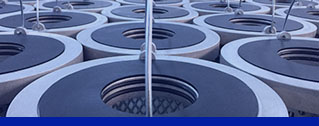
Filters are a small but very important part of hydraulic equipment, though serving no mechanical objective they are integral to the proper functioning of the machine and to prolonging the active lifetime of the tools and the hydraulic fluid which drives it. The role of a filter is to remove and/or include particles of contamination and keep the fluid that flows round the machine clear. Any contamination in the oil may cause damage to transferring elements further downstream, and this may result in seizing up of moving elements, corrosion of other elements and dear replacements. When we consider the implications of not utilizing a filter, the significance of those little objects turns into extra vital.
Â
There are two principal styles of hydraulic oil filter – surface and depth filters. The floor filter, as the title suggests, removes contamination from the surface of the oil and could also be helpful in purposes where gravity feeds the oil by means of a space appropriate for such a filter throughout operation. A depth filter can be submerged in a reservoir or chamber and can take away particles from everything of the physique of fluid. Depth filters subsequently, are simpler and can retain a larger quantity of contamination and undesirable particles earlier than they need to be cleaned or changed.
Â
The supplies used to make hydraulic filters varies, as does the fee accordingly. Glass filters are costlier but they're more efficient, especially when glass fibres are used in a depth filter. Glass can also be non-reactive, that means it may be used with any kind of hydraulic fluid. Metal filters are additionally reasonably environment friendly, however they cannot be used with all forms of hydraulic fluid, as a consequence of incompatibilities between sure hydraulic oils and a few metals. Where it's acceptable to make use of a metallic filter there is the choice of a magnetic filter system, which works as a depth filter and uses a magnetic cost to draw metallic particles that may have entered the fluid system. If the hydraulic equipment is used in steel working and fabrication then the chance of potential contamination being from metallic particles is excessive; magnetic filters will take care of this contamination whereas another sort of filter can be utilized to cope with different forms of pollution.
Â
Cellulose or paper will also be used to make a hydraulic fluid filter, however these have a short life expectancy and need frequent replacement. They're cheaper than the other sorts, but may end up costing extra in the long term, as a result of regular downtime for alternative and the potential damage to equipment if they don't seem to be changed usually sufficient.
Â
It might appear to be glass is your best option; regardless of costing a bit more it does one of the best job and won't want replacing too typically. The disadvantage of a glass filter is actually its power as effectively; the superior filtering potential can really lead to a drop in stress, within the system, which is normally undesirable. It is very vital, due to this fact, to test how a drop in hydraulic system stress will have an effect on productiveness and efficiency if you're contemplating switching to glass filters from one other materials kind. Consider also whether this drop in stress is likely to lead to pointless changes of stress reduction valves, resulting in probably dangerous build ups of stress elsewhere.
Â
The choices of hydraulic oil filters do not end after materials kind and building, as there is nonetheless the issue of scores and specs to take care of. All filters have an ISO 4406 score, and the decrease the code of any given filter, the higher it is at removing contamination. Hydraulic filters may also have a beta ratio, which is the ratio of particles found upstream of the filter divided by the quantity discovered downstream. For beta ratios, the higher it is the better, and this can also be used to provide a share for effectiveness.
Â
It is also necessary to examine that the movement rate of the filter is compatible with the circulate fee of the equipment it's for use in; too quick and the filter Additional hints will be unable to effectively remove contamination, too slow and it may become clogged quickly. The operational strain of the hydraulic system can be important, because the filter should be able to withstand that force for a chronic period of time. The ultimate thing to examine is that the filter might be linked to the tools, so examine the port dimension of the filter and guarantee it's suitable with the machinery in the location it's to be fitted.
Â
There's a lot to think about here, however selecting probably the most suitable hydraulic fluid filter is an train that it's worth spending a while on, as it could possibly make a big distinction to the performance and lifespan of your hydraulic tools and save on downtime and alternative costs in the long term.